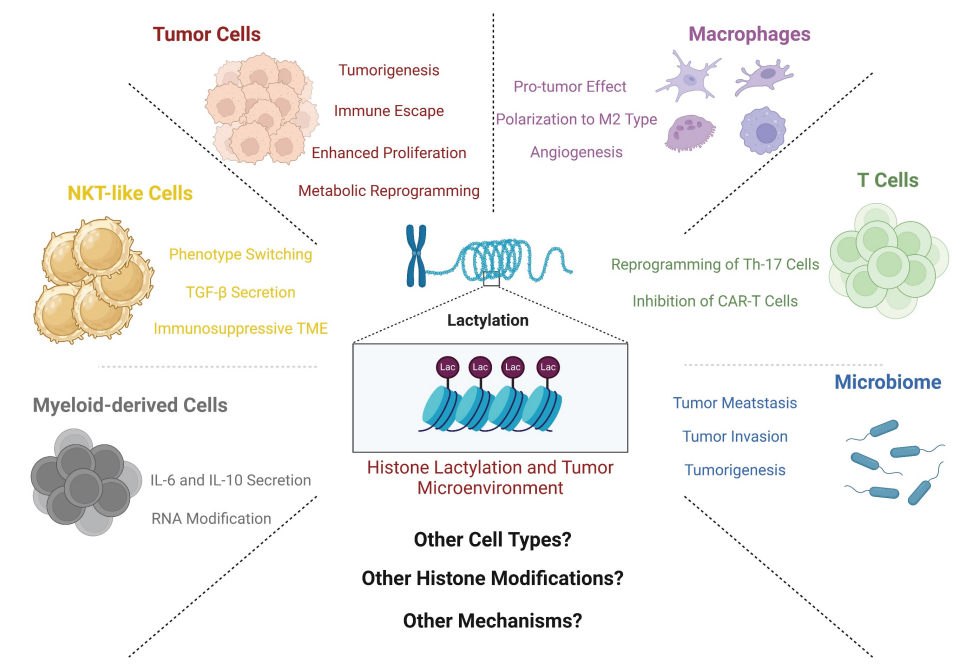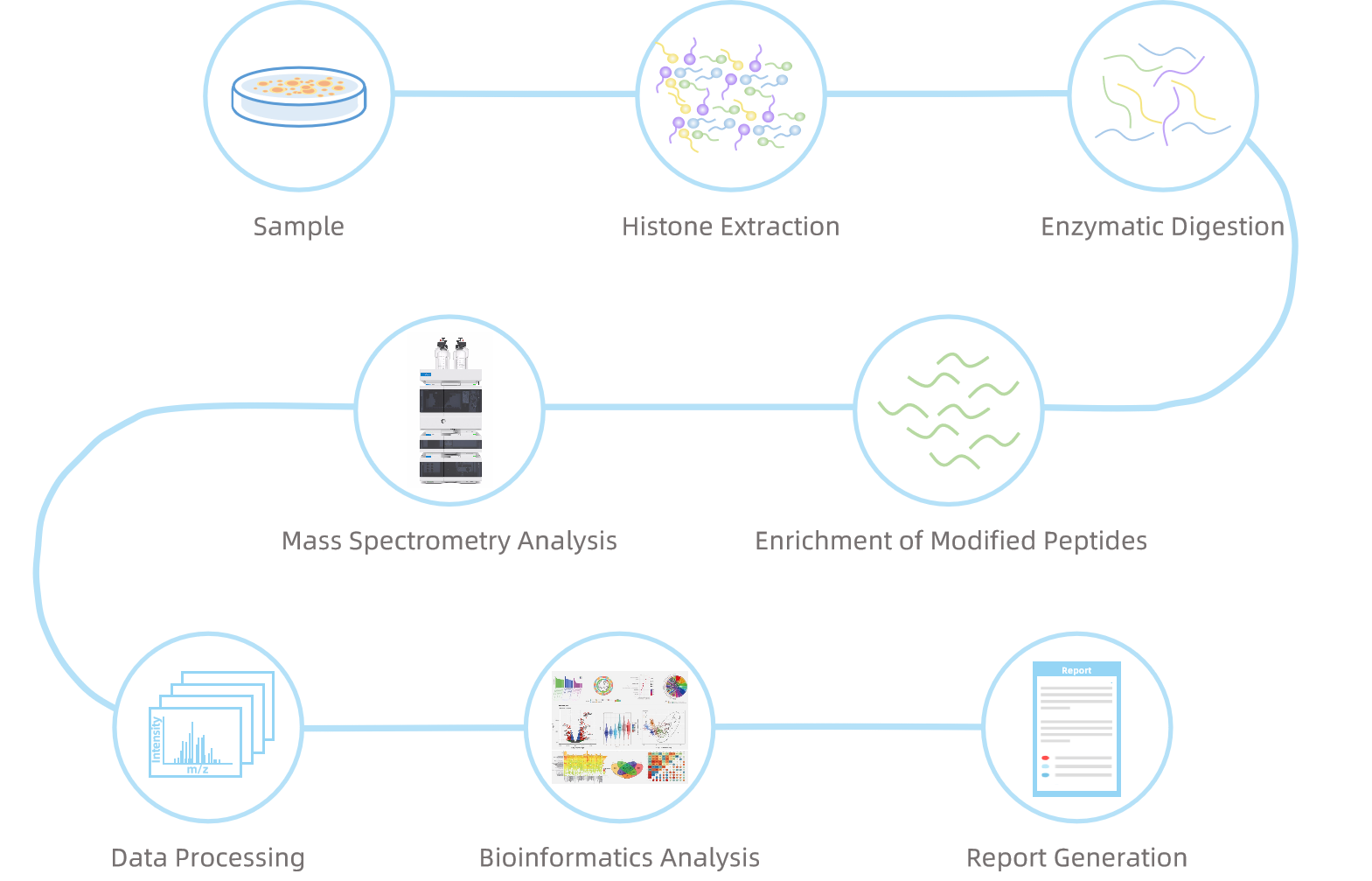Histone Lactylation Analysis
- Animal tissue ≥ 2 g
- Plant tissue ≥ 0.4 g
- Serum / Plasma ≥ 2 mL (plasma should be collected using EDTA as an anticoagulant)
- Urine ≥ 10 mL
- Cell ≥ 1 x 10⁸ cells
- Yeast / Microbial samples ≥ 0.4 g
- Protein samples: 2-5 mg (Standard tissue or cell lysis buffers can be used during protein extraction)
Lactate is a well-known and ubiquitous molecule, recognized primarily as a byproduct of the glycolytic pathway. In the complex landscape of glucose oxidation metabolism, pyruvate plays a pivotal role, being enzymatically converted to L-lactate by lactate dehydrogenase (LDH). This conversion is a common energy-generating process that occurs extensively in mammalian cells. Lactate used to be considered a mere metabolic waste product; however, recent research has unveiled its significant role, particularly in the context of cancer biology. Tumor cells exhibit an aberrant glycolytic behavior, producing excess lactate even in the presence of adequate oxygen—a phenomenon known as the Warburg effect. This insight has challenged the traditional classification of lactate as a metabolic byproduct and has highlighted its multifaceted roles in tumor biology.
Lactate intricately regulates various intracellular and extracellular dynamics, influencing gene expression, metabolic pathways, the tumor microenvironment (TME), and even the activation or inhibition of immune cells. In this context, histones—the essential components of chromatin—play a crucial role. Rather than being static, histones are subject to dynamic modifications, particularly at the lysine residues located near their N-termini. These modifications encompass a range of changes, including acetylation, methylation, and lactylation, collectively referred to as histone post-translational modifications (HPTMs). Histone lactylation is a specific post-translational modification involving the addition of a lactyl group to histones. An increasing number of investigations have reported that histone lactylation has emerged as a critical mechanism linking metabolic states to gene regulation. This novel modification offers insights into how lactate, traditionally seen as a metabolic waste, can influence chromatin structure and gene expression, thus playing a significant role in cellular responses to metabolic changes and stress.

Figure 1. Overview of Effects of Histone Lactylation and TME Components
Services at MtoZ Biolabs
MtoZ Biolabs utilizes Thermo Fisher's Q Exactive HF, Orbitrap Fusion, and Orbitrap Fusion Lumos mass spectrometry platforms, in combination with Nano-LC, to provide a comprehensive solution for histone lactylation analysis. Simply provide your experimental objectives and send us your samples, and we will offer you a one-stop service from sample preparation and MS analysis to data analysis, delivering detailed identification and quantitative analysis of histone lactylation modifications and their modification sites.
Compared to traditional proteomics analysis, the key to histone modification analysis lies in the isolation and purification of histone components, as well as mitigating the impact of N-terminal lysine on the analysis of histone post-translational modifications. Since histones are located in the cell nucleus, MtoZ Biolabs has developed a specialized platform for histone extraction and purification, drawing on existing literature and experimental experience. Cells are homogenized and subjected to low-speed centrifugation to obtain the nuclei. The nuclei are then further disrupted to release histones and DNA. High-salt buffer is used to remove impurities, and High-Performance Liquid Chromatography (HPLC) is employed to separate different histone components, achieving optimal purity for subsequent mass spectrometry analyses. Additionally, to eliminate the impact of N-terminal lysine, we utilize 2-3 different enzymes to enhance peptide coverage in mass spectrometry analysis during the digestion process. This multi-enzymatic digestion increases the coverage of histone peptides, preventing the loss of post-translational modification information due to unsuitable peptide lengths or low ionization efficiency.
Analysis Workflow

Service Advantages
1. Advance Analysis Platform
Mtoz Biolabs established an advanced histone lactylation analysis platform, guaranteeing reliable, fast, and highly accurate analysis service.
2. One-Time-Charge
Our pricing is transparent, no hidden fees or additional costs.
3. High-Data-Quality
Deep data coverage with strict data quality control. AI-powered bioinformatics platform integrate all histone lactylation analysis data providing clients with acomprehensive data report.
4. Optimized Extraction
An optimized histone extraction and purification protocols are employed to minimize contamination and ensure high purity.
Sample Submission Requirements
1. Sample Volume
2. Sample Preservation
Samples should be shipped with dry ice. Avoid repeated cycles of freezing and thawing
Note: We will conduct testing on the provided samples. The formal experiment will commence only after the samples pass the quality check.
Deliverables
1. Comprehensive Experimental Details (Materials, Instruments, and Methods, etc.)
2. Relevant Liquid Chromatography and Mass Spectrometry Parameters
3. Detailed Information on Histone Lactylation Analysis
4. Raw Data
5. Mass Spectrometry Image
6. Custom Analysis Report
MtoZ Biolabs, an integrated Chromatography and Mass Spectrometry (MS) Services Provider, provides advanced proteomics, metabolomics, and biopharmaceutical analysis services to researchers in biochemistry, biotechnology, and biopharmaceutical fields. Our ultimate aim is to provide more rapid, high-throughput, and cost-effective analysis, with exceptional data quality and minimal sample consumption. If you are interested in our histone lactylation analysis services, please feel free to contact us. We are dedicated to providing you with the best service.
MtoZ Biolabs, an integrated chromatography and mass spectrometry (MS) services provider.
Related Services
How to order?







